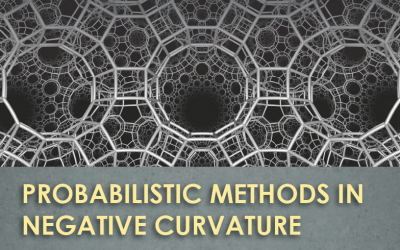The focal area of the program lies at the juncture of three areas:
- Probability theory of random walks,
- Ergodic theory of flows on negatively curved spaces,
- Gromov hyperbolic groups.
Random walks on finite and infinite, finitely generated groups is a topic of considerable vintage. It is well-known, starting with Kesten's characterization of amenability, that asymptotic properties of such random walks are intimately connected to the large scale geometry of the underlying group. Vershik and Kaimanovich (1983) introduced entropic techniques to study the Poisson boundary of random walks on countable discrete groups, which is a natural measure theoretic space "at infinity" associated with the random walk. In a seminal paper in 2000, Kaimanovich gave a very general sufficient condition on the one step distribution of the walk on a hyperbolic group for the Poisson boundary to equal the (geometric) Gromov boundary. Further probabilistic methods have started being applied to hyperbolic groups relatively recently including a local limit theorem and some foundational results have been proven by the French school.
From the ergodic theory perspective, one of the highlights has been the classification of stationary measures on homogeneous spaces by Benoist and Quint. The ideas in their work, in particular "exponential drift" have found applications in the seminal work of Eskin and Mirzakhani on rigidity properties on moduli spaces. This will be one of the main themes of the ergodic theory component of the workshop.
The program will have 6 mini-courses of 4 lectures each, with each lecture about 1 hour 15 minutes with tentative themes as follows:
1) Dmitry Dolgopyat (University of Maryland) - Circle rotations and dynamics on the modular surface
2) Sebastien Gouezel (University of Nantes ) - Random walks on hyperbolic groups - II
3) Peter Haissinsky (Aix-Marseille University) - Random walks on hyperbolic groups - I
4) Vadim Kaimanovich (University of Ottawa) - Poisson boundaries
5) Jean-Francois Quint (Institute of Mathematics of Bordeaux) - Random walks on reductive groups
6) Francois Ledrappier (University of Notre Dame)
Eligibility Criteria:
The program is aimed at active researchers working in probability, ergodic theory and hyperbolic geometry with an emphasis on their interactions. One purpose of the program is to serve to bring members of the academic community (esp. the Indian community) in these areas together to foster cross-fertilization. Since the program is relatively advanced, the primary focus will be on young faculty members and postdocs in these areas. However, PhD students with demonstrable expertise in these areas are also encouraged to apply.
 icts
icts res
res in
in


